School of Resources and Environment
2015-07-01 11:23:29 views:0
The College of Agricultural Resources and Environment was founded in August 2005. Presently there are 67 members, including 55 faculties, of which 49 have doctor's degree, 9 are professors, and 21 are associate professors.
The college consists of two departments, i.e. the department of agricultural resources and department of ecology & environment, and six majors, i.e. the agricultural resource and environment, land management, ecology, environmental science, environmental engineering and eco-environmental engineering. Agricultural resource and environment is the key major of Shandong province for the practical talent training. Both environmental science and environmental engineering are the key majors in QAU. Totally there are 1476 fulltime undergraduate students studying in the college.
Discipline of agricultural resource and environment are entitled to confer Master degree, covering majors of soil science, plant nutrition, agricultural environmental protection and land resource management. Plant nutrition is the key major of Shandong province. Moreover, master degree of agricultural extension is conferred. Totally there are 59 fulltime graduated students studying in the college.
Scientific research
The college owns Institute of Soil and Fertilizer Research and Institute of Agro-Ecology and Environmental Health, QAU. The Qingdao Center for Rural Environmental Engineering Research, and the Joint Station of Marine Fishery Environment Monitoring are also located in the college.
Main research field
The main research fields are field crop nutrition, effective use of fertilizer resources, soil fertility and improvement, soil pollution and remediation, process and mechanism of water pollution, control of agricultural area-source pollution, sewage treatment and environmental material, and so on. In the recent three years, faculties of the college totally achieved 17.3 million Chinese Yuan of scientific funds, of which 12.2 million are from national funding, published more than 140 papers, of which 64 papers are published in international journals, obtained 8 national patents, and won two of provincial S & T progress prizes.
International cooperation
The college emphasizes on international academic exchanges and cooperation. We have built cooperation on research with more than ten universities and institutes in the USA, the Netherlands, German, Italy, and so on. Education collaboration has been developed with Pennsylvania State University and Murray State University.
Professors
Prof. Yan-Xi Shi, Ph. D, dean. Main research fields: nutritional physiology of sweet potato; agricultural area-source pollution control.
Prof. De-Ming Guo, Master, secretary of the party committee. Main research field: agriculture industrial economics.
Prof. De-Jie Cui, Ph. D, assistant dean for education. Main research fields: saline and alkaline soil improvement; soil prevention of consecutive cropping.
Prof. Jun-Liang Li, Ph. D, assistant dean for lab training and practice. Main research fields: irri-fertilization; high-yielding cultivation of sweet potato.
Prof. Kai-Rong Wang, Ph. D, assistant dean for research, international cooperation, and social service. Main research fields: farming soil pollution and remediation; management of nutrient recycling in agro-ecosystem.
Prof. Shu-Tang Liu, Ph. D, chair of the department of agricultural resources. Main research fields: build-up and succession of soil fertility; fertilization management for high-yielding corn.
Prof. Chao Chai, Ph. D, chair of the ecology and environment, Main research field: process and mechanism of water pollution.
Prof. Fang-Gong Sui, Ph. D. Main research fields: field crop nutrition and fertilization, crop physiology of lodging resistant.
Prof. Ming-Li Chen, master. Main research field: land resource management.
Department of Agricultural Resources
Presently there are 26 fulltime faculties, of which 20 have doctoral degree, 7 are professors, and 13 are associate professors. Three main research fields in this department are crop nutrition and effective use of fertilizer resources, soil fertility and improvement, and control of agricultural area-source pollution.
1. Crop nutrition and effective use of fertilizer resources
The aim is to achieve effective and environment-friendly use of fertilizer resources. It focus on the characteristics of soil fertility, nutrient requirement of the crop, coordination of water and fertilizer, combination of inorganic and organic fertilizers. Based on a long-term located fertilizer experiment since 1978, in the Station for Soil Fertility Monitering, the main researches are focus on mechanism of the build-up and succession of soil fertility, balancing soil carbon and nitrogen, and effective use of fertilizer resources. Technology of irri-fertilization for vegetable and fruit productions and development of sulfur-coated slow release urea fertilizer are also pay attention in this section.
2. Soil fertility and improvement
The aim is to solve the problems of soil acidification, salinization and special soil hinders in consecutive cropping system. The main researches are focus on prevention soil hinders in green house vegetable production, acidification and remediation of orchard soil, regular of water and salt movements in saline and alkaline soil, improvement and utilization of saline and alkaline soil, selection of salt-tolerant crop species and development of saline and alkaline anti-reagent. There is a vegetable research station for irri-fertilization located in Shouguang city, and a station for saline and alkaline soil improvement located in Yellow River delta.
3. Control of agricultural area-source pollution
Studies are mainly focus on nutrient transfer in high-yielding farming system and its relationship with agricultural area-source pollution, effect of bio-defense to soil erosion in orchard, contamination of phthalic acid ester (PAEs) by using plastic films, and prevention of nitrate pollution in soil-crop-water systems. We developed a soil erosion control technology by employing plants from family Vulpi.
In the recent three years, faculties of this department totally obtained over 30 research projects, acquired a total of 11 million Chinese Yuan, published more than 70 papers, achieved 5 national patents, and won 2 provincial S & T progress prizes.
Department of ecology and environment
Presently there are 29 fulltime faculties, of which 28 have doctoral degree, 2 are professors, and 12 are associate professors. Three main research fields in this department are soil pollution and remediation, process and mechanism of water pollution, and sewage treatment and environmental material development.
1. Soil pollution and remediation
Various pollutants in farmland include heavy metal, pesticide and phthalic acid ester (PAEs). Main researches are focus the occurrence cause, environmental behaviors, toxicity for organism and associated treatment of the pollutants. The emphasis is to investigate the occurrence cause, movement in environment, and potential risk in food chain of Cd, Hg, Cr, Pd, and PAEs, to understand from molecular biology and ecological aspects how plants resist and tolerate Cd pollution., and to develop reagents and remediation for soil heavy metal pollution.
2. Process and mechanism of water pollution
Organic and inorganic pollutants are monitored and assessed. Process, mechanism, and associated technology for treatment are studied. The main point is the translocation, transformation of Hg in water; environmental behavior and ecological risk of alkane, polynuclear aromatic hydrocarbons (PAHs), poly brominated diphenyl ethers (PBDEs), and so on. Study how eutrophication intensity affects the fate of PBDEs in environment significantly
3. Sewage treatment and environmental material development
Study the application of paramount oxidation-reduction technology on industrial wastewater treatment. Apply the eco-material in sewage treatment. The main points are development of carbon nanotube, TiO2 nanotube, polysul-fone membrane and poly vinyl chloride membrane. New electric and photochemical catalysis technology will be used in special wastewater treatment, such as chloracyl substrate, pesticide, dyestuff and so on. Separations of starch and protein from waste water coming from food processing industry with membrane are studied. Nitrogen removal technology from drinking water in the village is on the way.
In the recent three years, department faculties totally obtained over 20 scientific projects, acquired a total of about 6 million Chinese Yuan, published more than 70 papers, of which 40 are published in international journals.
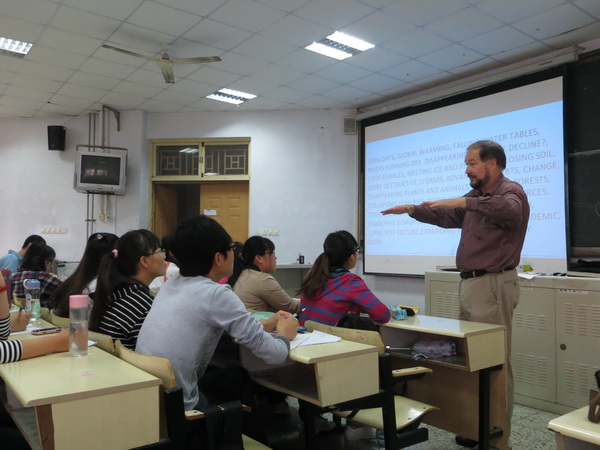
International Education –Dr. Cameron, an environmental engineering expert from Penn State University of USA is teaching an environmental eco-engineering course for graduated students in major of agricultural resource & environment
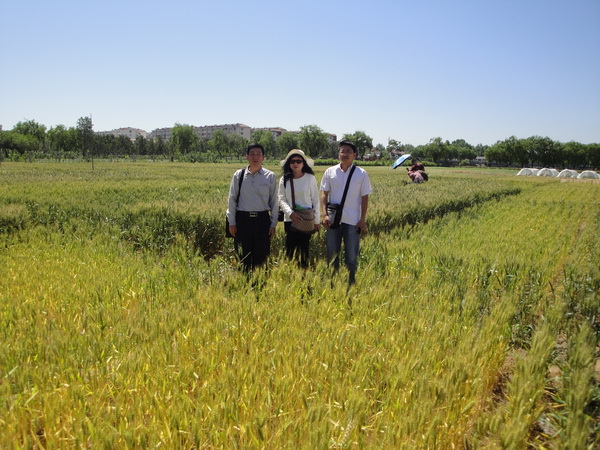
Long-term located fertilization experimental study –Prof. Liu is introducing the filed experiment located on the Laiyang experimental farm since 1978 to Prof. Iin Handayani (center), a soil scientist from Murray State University of USA
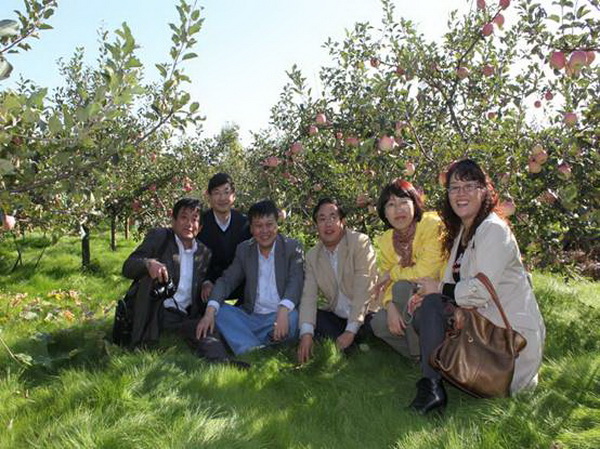
Researches on agricultural area-source pollution and soil protection –grass cover orchard to protect soil and water and control agricultural area-source pollution
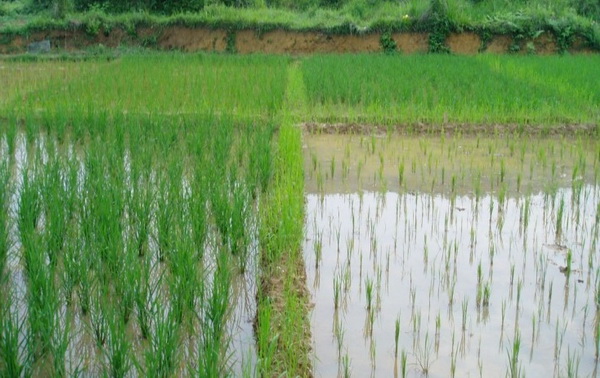
Soil pollution remediation research –remediation of Cd and Pb polluted paddy rice soil by using new soil improvement agents
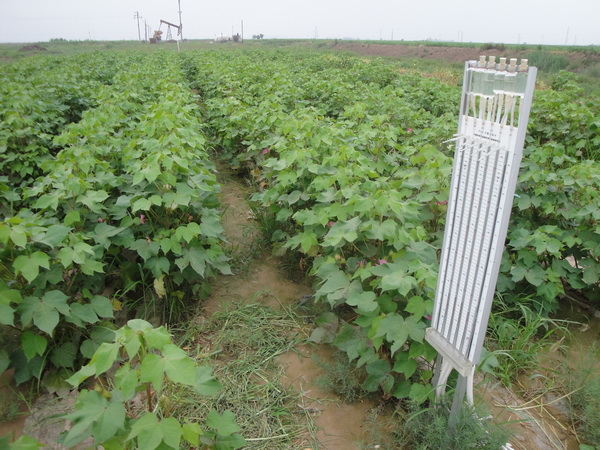
Studies on the improvement and utilization of saline and alkali soil –cotton cultivation in shallow groove rounding soil
Qingdao Agricultural University
About QAU | | Research | International | Alummi | Study At QAUAddress:No. 700 Changcheng Road, Chengyang, Qingdao, Shandong, China. P.C. 266109
Web Design: News Center of Qingdao Agricultural University.




